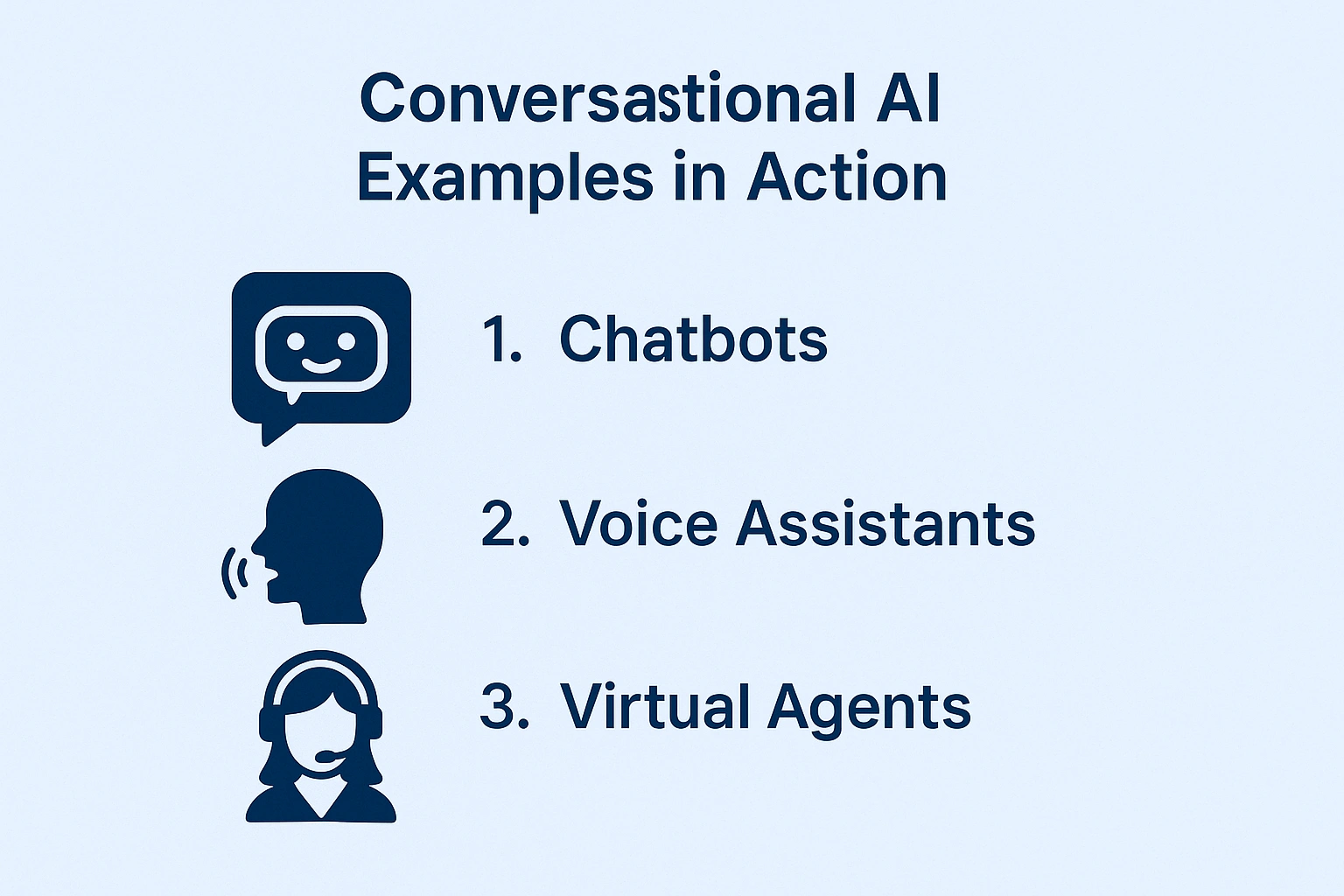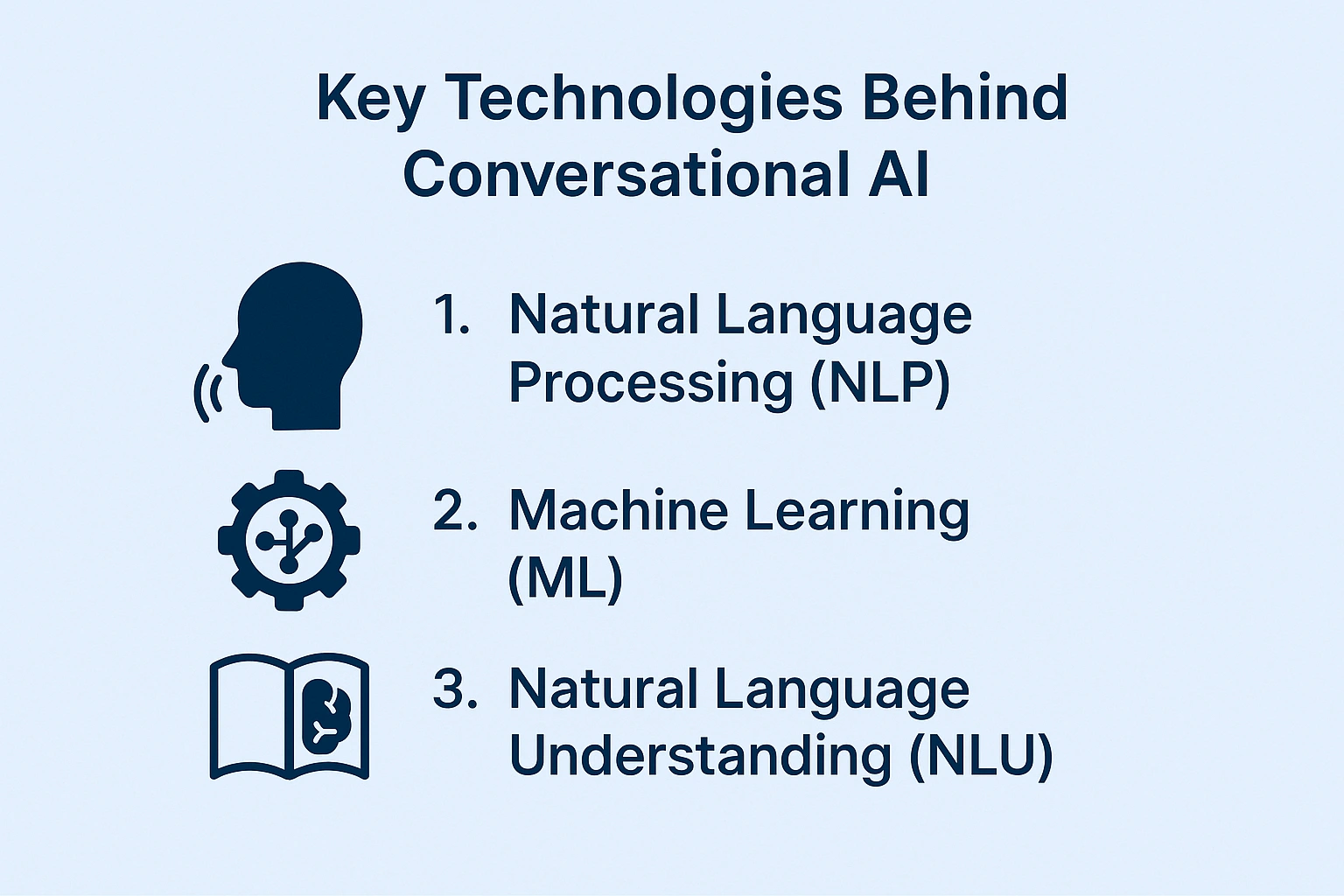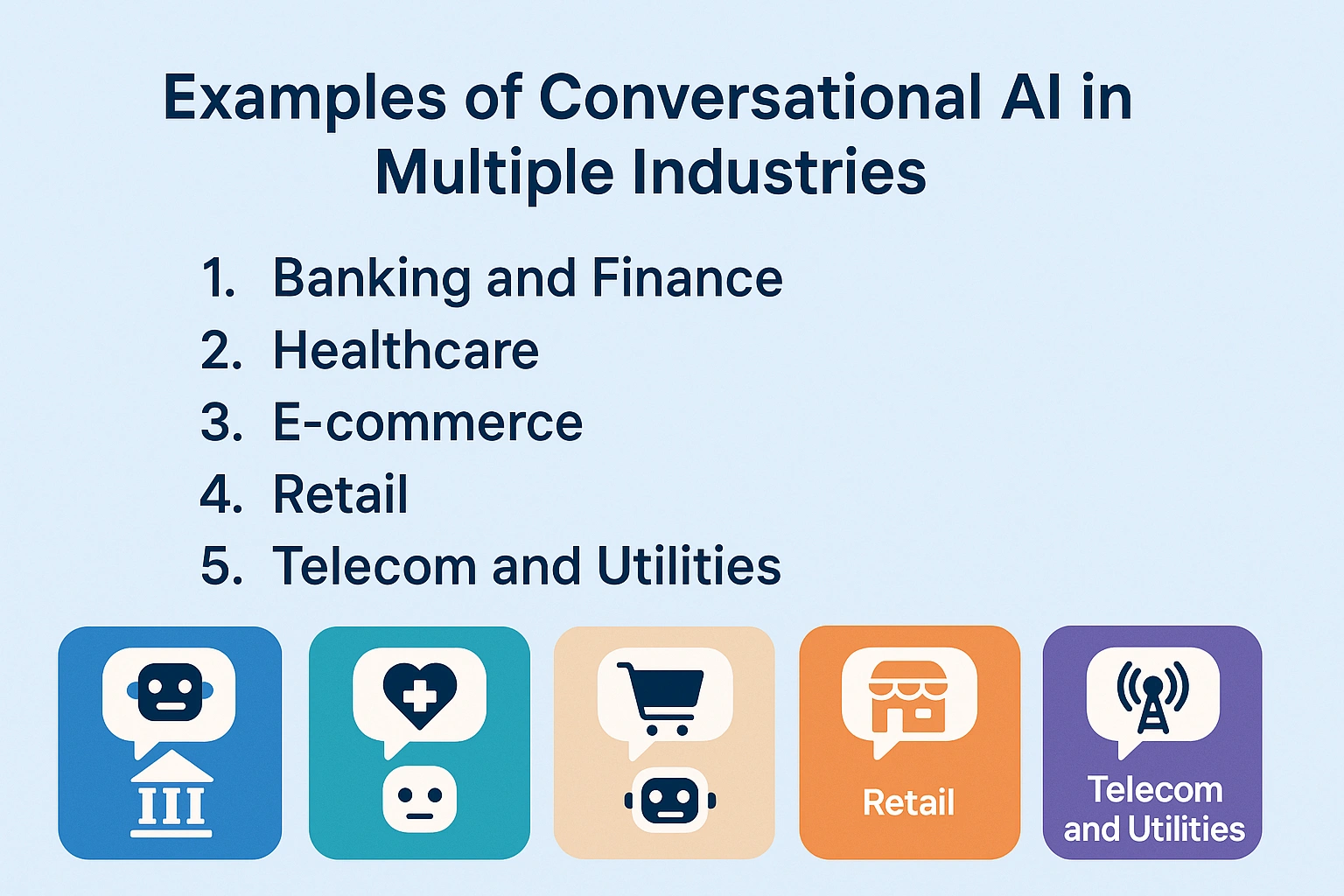Conversational AI is quickly becoming vital for businesses to streamline communication and improve customer service. From website chatbots to AI voicebots, the tech enables efficient, personalized engagement. Convin’s AI-powered system automates 100% of inbound and outbound calls, increases sales-qualified leads by 60%, and supports multiple languages for seamless customer interactions. This blog explores real-world conversational AI examples, how it works, and why it's essential for future-ready business communication. Ready to see the impact? Keep reading for insights.
See conversational AI in action now.
What Is Conversational AI?
Conversational AI refers to technologies that enable machines to understand, process, and respond to human language in a natural way. It powers tools like chatbots, virtual assistants, and voice bots that simulate human conversations through text or speech.
These systems combine Natural Language Processing (NLP), Machine Learning (ML), and speech recognition to enable automated, intelligent, and personalized interactions. Unlike simple rule-based bots, conversational AI can learn from interactions, understand context, and improve over time.

Conversational AI Examples in Action
- Chatbots for customer service interactions on websites.
- Voice assistants like Siri and Alexa answer questions, control devices, and assist users.
- Virtual agents that handle complex queries and perform actions like booking appointments or troubleshooting technical issues.
Conversational AI helps businesses engage with customers at scale while reducing operational costs. It’s a crucial tool for delivering personalized and efficient customer experiences across various industries.
Try AI-powered conversations today.
What is an Example of Conversational AI?
A classic example of conversational AI is a customer support chatbot used by e-commerce companies. These bots handle common queries like order tracking, returns, and refund status without human intervention.
Key Features of This Example:
- 24/7 Availability: Bots provide instant support anytime.
- Natural Language Understanding: They interpret customer queries, even with typos or casual phrasing.
- Personalized Responses: Integrated with CRMs, they offer tailored responses based on user data.
- Escalation to Human Agents: If a query is complex, the bot can route it to a human with full conversation history.
Real-World Use Case:
For instance, Convin's contact center intelligence platform uses conversational AI to analyze, summarize, and draw insights from real customer conversations. This allows sales and support teams to learn from past interactions and improve performance in real time.
This type of implementation reduces workload, boosts customer satisfaction, and ensures consistent service across touchpoints.
Automate support with conversational AI.
This blog is just the start.
Unlock the power of Convin’s AI with a live demo.

How Does Conversational AI Work?
It's important to delve into the underlying technologies to understand how conversational AI works. At the heart of this innovation are NLP and machine learning models. These systems process vast amounts of data to learn patterns, making them smarter over time.
Conversational AI uses data input to understand context, sentiment, and intent before generating responses that feel human-like.

Key Technologies Behind Conversational AI:
- Natural Language Processing (NLP): NLP enables AI to understand and process human language by breaking it down into smaller parts: words, phrases, and sentences.
- Machine Learning (ML): ML models learn from previous interactions and continuously improve response accuracy.
- Natural Language Understanding (NLU): This subset of NLP helps the AI understand the semantics and sentiment behind the words, enabling more contextually relevant responses.
With NLP and NLU, conversational AI can respond to open-ended questions, handle multi-turn conversations, and adapt to various user inputs. Unlike traditional chatbots that follow predefined scripts, conversational AI can offer users dynamic, real-time interactions that feel intuitive.
As businesses look for ways to improve customer interactions, implementing conversational AI assistants in customer service has become a game-changer.
1. Conversational AI Assistants in Customer Service
Conversational AI assistants offer tremendous value for businesses, especially those in customer service-heavy industries like call centers. These AI systems can engage with customers across multiple channels, phone, chat, and email automating many aspects of the customer experience.
They handle inquiries, resolve issues, and perform routine tasks without human intervention, such as resetting passwords or checking order statuses.
Benefits of Conversational AI Assistants:
- Increased efficiency: AI assistants respond instantly, eliminating wait times.
- Cost savings: Automating customer interactions reduces the need for large customer service teams.
- Personalized experiences: AI assistants use data to deliver tailored responses based on customer history and preferences.
For example, many call centers now deploy conversational AI assistants to handle frequently asked questions, reducing the load on human agents. These assistants are available 24/7, ensuring customers get help anytime, increasing customer satisfaction and retention.
2. Conversational AI Automation in Customer Support
In the fast-paced world of customer service, speed and efficiency are critical. This is where conversational AI automation comes into play. AI can drastically improve support teams' response time and productivity by automating repetitive tasks.
Features of Conversational AI Automation:
- Ticket resolution: AI systems can resolve common issues automatically by guiding users through predefined workflows.
- Order tracking: Customers can check the status of their orders through automated systems without speaking to a human agent.
- Basic troubleshooting: AI assistants can walk customers through troubleshooting steps for common technical issues, reducing the need for live support.
This automation helps companies manage thousands of interactions simultaneously, ensuring every customer query is answered. The result is reduced response times and improved customer experiences, as AI assistants can provide immediate solutions to common issues.
As we explore further, the impact of conversational AI becomes evident across various industries. Each leverages the technology uniquely to improve customer engagement and operational efficiency.
Explore industry-specific AI examples.
Examples of Conversational AI in Multiple Industries
Many industries are leveraging conversational AI to transform their customer interactions. From banking to retail, companies use AI-powered chatbots and virtual assistants to provide a seamless experience that saves time and enhances customer satisfaction.

1. Conversational AI in Banking and Finance
Conversational AI automates routine tasks such as balance inquiries, loan applications, and fraud detection in the financial sector. Conversational AI automation helps banks provide instant support to customers, reducing the need for in-person interactions.
Example:
AI-powered assistants in banks handle tasks like loan processing, offering customers personalized experiences based on their financial data. This reduces customer wait times and improves the bank’s efficiency in processing requests.
2. Conversational AI in Healthcare
Healthcare is another industry experiencing significant transformation through conversational AI. Virtual assistants help patients schedule appointments, provide medication reminders, and answer basic medical questions, freeing up medical staff to focus on more critical tasks.
Example:
In hospitals, conversational AI assistants engage patients, collect necessary information, and guide them through appointment scheduling or prescription renewals. This automation helps healthcare providers manage patient inquiries more efficiently.
3. Conversational AI in E-commerce
E-commerce companies use conversational AI assistants to improve the shopping experience by offering personalized recommendations, assisting with product inquiries, and following up on abandoned carts.
Example:
AI-powered chatbots in e-commerce provide real-time assistance by guiding customers through purchasing and recommending products based on their browsing behavior. This enhances the customer experience and increases conversion rates.
4. Conversational AI in Retail
Retailers are using conversational AI to provide personalized shopping experiences both online and in stores. Virtual assistants help customers locate products, learn about promotions, and receive recommendations based on their shopping history.
Example:
Retail chatbots can suggest products and promotions based on customer preferences, helping retailers increase customer engagement and loyalty.
5. Conversational AI in Telecom and Utilities
Telecom companies use conversational AI for customer support, offering solutions for billing inquiries, account management, and service outages. These automated systems help telecom providers manage large volumes of requests efficiently.
Example:
AI-powered virtual assistants in telecom offer billing support and notify customers about service disruptions, enabling quicker resolution and reducing the load on human support staff.
As more industries embrace conversational AI, the reasons behind this shift become clearer—businesses need to streamline communication, improve efficiency, and reduce costs.
Explore Convin’s AI-powered features.
Convin’s AI-Powered Phone Calls: The Next Level of Conversational AI
For call centers looking to improve both inbound and outbound communication, Convin’s AI Phone Calls provides a highly effective solution. Convin’s AI-powered virtual agent automates calls, allowing businesses to reach thousands of customers with minimal effort. With its ability to handle a large volume of calls in real time, Convin’s solution helps call centers improve efficiency while reducing operational costs.
Key Data Points from Convin:
- 100% Automation: Convin’s AI handles both inbound and outbound calls, ensuring no manual intervention is needed.
- 60% Increase in Sales-Qualified Leads: By automating the initial stages of customer interaction, the AI voicebot qualifies leads, ensuring that only high-potential prospects are passed to human agents.
- Multilingual Capabilities: The AI system supports multiple languages, ensuring customers can communicate in their preferred language.
Additional Features of Convin’s Voicebot:
- Real-Time Personalization: Conversations are tailored based on customer data, improving engagement.
- Seamless Integration: Convin integrates with existing CRM systems, ensuring smooth operations without disruptions.
Convin’s voicebot solution has transformed how call centers engage with customers, significantly improving efficiency and customer satisfaction. Call centers that adopt this technology can expect a significant reduction in operational costs, an increase in lead conversion rates, and a boost in customer satisfaction scores.
Maximize ROI with conversational AI.
Why Conversational AI Is the Future of Business Communication
The shift toward conversational AI is inevitable as companies look for ways to automate communication and improve operational efficiency. For many, the question is no longer "why conversational AI" but how quickly they can adopt it to stay competitive. This technology allows businesses to deliver real-time, personalized communication at scale, which traditional methods cannot achieve.
Key Benefits:
- Scalability: Businesses can handle thousands of customer queries simultaneously.
- Cost Reduction: Automating communication reduces labor costs and improves overall efficiency.
- Improved Customer Satisfaction: With faster response times and personalized interactions, customers are more likely to have positive experiences.
By integrating conversational AI, companies can offer a seamless experience across channels, making it easier for customers to interact with their brand through chat, email, or voice.
Among the leading conversational AI solutions, Convin’s AI-powered phone calls offer next-level automation for businesses, especially in call centers.
Schedule a Convin demo today!
FAQs
1. What are some real-world conversational AI examples?
Examples include virtual assistants, chatbots, voice bots in banking, healthcare, e-commerce, and contact centers using AI to automate conversations and improve customer service.
2. How does conversational AI improve customer experience?
Conversational AI offers instant, personalized support, resolves queries faster, operates 24/7, and learns from interactions to continually improve user engagement and satisfaction.
3. What industries use conversational AI the most?
Top industries include retail, banking, healthcare, telecom, and insurance, where AI handles customer queries, appointment scheduling, product recommendations, and fraud detection.
4. What’s the difference between a chatbot and conversational AI?
Chatbots follow pre-set rules, while conversational AI understands natural language, context, and learns from interactions to deliver smarter, human-like conversations.
5. Can small businesses benefit from conversational AI?
Yes, small businesses use conversational AI for automating FAQs, qualifying leads, handling bookings, and offering 24/7 support without expanding customer service teams.



.avif)






.avif)